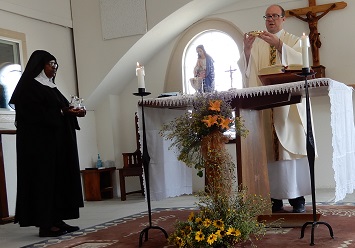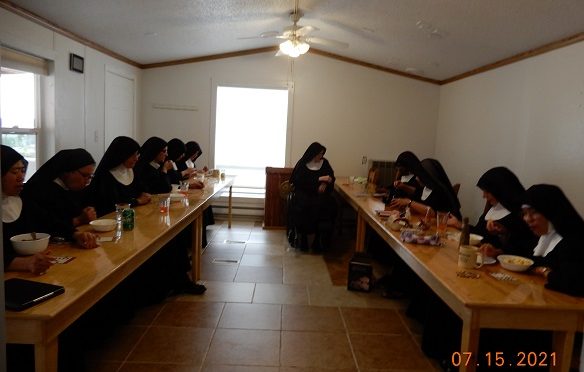

OUR SCHEDULE
SUNDAYS
4:30 am, Vigils
6:20 am, Lauds
8:40 am, Terce
9:00 am, Mass
12:00 pm, Middle Hour of Sext w/Main meal
5:30 pm Vespers
7:15 pm Compline
WEEKDAYS
4:30 am, Vigils
6:20 am, Lauds
7:00 am, Mass
9:00 am, Terce/Work Period/Classes
12:00 pm, Middle Hour of Sext/Main Meal
3:15 pm None
4:00 pm Lectio Divina
5:30 pm, Vespers
7:15 pm, Compline
MONASTIC CONTEMPLATIVE LIFE
Indeed, nothing is to be preferred to the work of God. (Rule of St. Benedict 43:3)
The phrase monastic means living according to the Rule of St. Benedict, in a monastery, under the guidance of a prioress, abbess, or abbot (for monks). The monastic life involves living the ordinary life in seeking God.
Benedictine spirituality is founded is silence, solitude, holy reading and prayer. Our Horarium or daily schedule begins with Vigils at 4:30 am, as noted above. We celebrate Mass daily or Communion Service and meet seven times a day to pray the Divine Office as structured by the Rule of St. Benedict. All 150 Psalms are chanted in English, in the course of two weeks, which include scripture texts, canticles and hymns directed by the Benedictine tradition.
Our day includes one hour of Lectio Divina, (sacred reading of Scripture) every afternoon.
MONASTERY OF OUR LADY OF THE DESERT – Our title inspires us to meditate continually on the inquiry, How does Our Lady live desert spirituality? One of our sisters replies, think we can live Marian spirituality by imitating the Virgin at the moment of the Annunciation: her way when she received the word of God “with humility and obedience in faith,” Another says, “We are the living members of the church in the desert.”
In addition, as the title of our monastery implies we are especially devoted to Our Lady, who is prefigured in the Book of Revelations as the woman who fled into the desert where she had a place prepared by God. (Rev 12:6). She serves not only as a model of silence and obedience for us, but also as a model of discipleship. We continue to re-live and perpetuate the presence and the work of Mary by imitating her “welcoming the Word, adoring, praying and keeping silence through our solitary and contemplative daily life.
WORK AND PRAY Ora et labora, a Latin phrase that is roughly translated as work and prayer. A secluded life of prayer means steadfast attention to communal and private prayer. Prayer holds the first place in our daily life: nothing must be preferred to this activity. St. Benedict saw work as another way to glorify God as well as a means to earn an income for the monastery. He believed that idleness is bad for the soul; therefore, the brethren must be employed at certain fixed time in the work of their hands.

Our work period each day except Sundays and solemnities is approximately four hours. The work periods find us engaged in sewing, cleaning, cooking. Some sisters, who are skilled in certain crafts such as weaving, and making Rosaries, sell their crafts, computer work, etc. One of our sisters is writing icons, one of which is featured on the cover of our Journey of Trust music CD. We have no external Apostolate.
 REFECTORY The Refectory is a dining room, a special place in the monastery. Rule of St. Benedict, Chapters 38 to 41 outlines the specifics of tasks and etiquette. Reading will always accompany the meals of the monks. The proper amount of food and drink provide all tables with two kinds of cooked food in this way, the person who may not be able to eat one kind of food may partake of another the times for the monks meals, etc.
REFECTORY The Refectory is a dining room, a special place in the monastery. Rule of St. Benedict, Chapters 38 to 41 outlines the specifics of tasks and etiquette. Reading will always accompany the meals of the monks. The proper amount of food and drink provide all tables with two kinds of cooked food in this way, the person who may not be able to eat one kind of food may partake of another the times for the monks meals, etc.
After the community has prayed Middle Hour of Sext (Noon), everyone processes from the St. Joseph Chapel to the Refectory. The server of the week intones the blessing before the meal that changes depending on the liturgical season, in Ordinary Time we all join in singing: All your creatures look to you to give them their food in due season. Praise the Father, the Son and the Holy Spirit, both now and forever. Amen Lord have mercy. Christ have mercy. Lord have mercy. This is followed by the Prioress words, “Bless us O Lord, and these your gifts which we are about to receive from your goodness through Christ our Lord. The Response is: Amen.” As noted in Chapter 38 of the Rule of St. Benedict, Verse 5, “Let there be complete silence. No whispering, no speaking only the reader’s voice should be heard there.
All your creatures shall thank you, O Lord And your friends shall repeat their blessings. Praise the Father, the Son and the Holy Spirit, Both now and forever. Amen. Lord have mercy. Christ have mercy. Lord have mercy Followed by the Prioress’s words: “We give you thanks, Almighty God, for all your gifts. You live and reign forever and ever. Amen.
